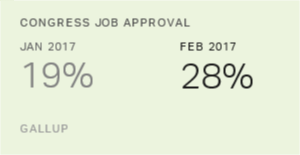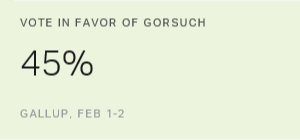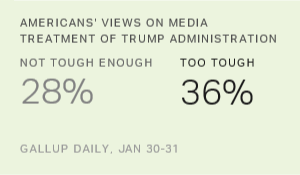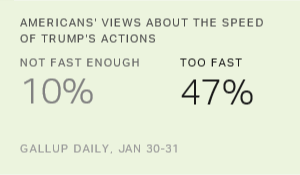Story Highlights
- Approval up from 19% in January
- Biggest month-to-month jump since February 2009
- Republicans' 50% approval up from 20% last month
WASHINGTON, D.C. -- Congressional job approval jumped to 28% this month from 19% in January. This is the largest month-to-month increase since a 12-percentage-point rise between January 2009, when former President Barack Obama was first inaugurated, and February 2009. The current 28% job approval rating is the highest since early fall 2009 and is close to Gallup's historical average (30%). The increase comes after Donald Trump's inauguration as president gave Republicans control of the presidency and both houses of Congress.
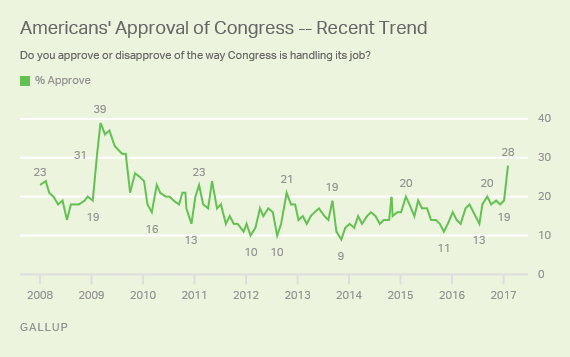
The increase in congressional job approval in February is mainly the result of a surge in Republicans' approval, which more than doubled in the past month, to 50%. Independents' approval increased slightly to 25%, and Democrats' approval dropped eight points to 11%.
This mirrors the pattern seen in February 2009 after Obama took office and gave Democrats control of Congress and the presidency. Democrats' approval rose from 18% to 43% between January and February of that year, while Republicans' approval fell by four points. Independents' approval rose from 17% to 29%.
| January | February | Change | ||||||||||||||||||||||||||||||||||||||||||||||||||||||||||||||||||||||||||||||||||||||||||||||||||
|---|---|---|---|---|---|---|---|---|---|---|---|---|---|---|---|---|---|---|---|---|---|---|---|---|---|---|---|---|---|---|---|---|---|---|---|---|---|---|---|---|---|---|---|---|---|---|---|---|---|---|---|---|---|---|---|---|---|---|---|---|---|---|---|---|---|---|---|---|---|---|---|---|---|---|---|---|---|---|---|---|---|---|---|---|---|---|---|---|---|---|---|---|---|---|---|---|---|---|---|---|
| % | % | pct. pts. | ||||||||||||||||||||||||||||||||||||||||||||||||||||||||||||||||||||||||||||||||||||||||||||||||||
| 2017 | ||||||||||||||||||||||||||||||||||||||||||||||||||||||||||||||||||||||||||||||||||||||||||||||||||||
| Republicans | 20 | 50 | +30 | |||||||||||||||||||||||||||||||||||||||||||||||||||||||||||||||||||||||||||||||||||||||||||||||||
| Independents | 17 | 25 | +8 | |||||||||||||||||||||||||||||||||||||||||||||||||||||||||||||||||||||||||||||||||||||||||||||||||
| Democrats | 19 | 11 | -8 | |||||||||||||||||||||||||||||||||||||||||||||||||||||||||||||||||||||||||||||||||||||||||||||||||
| 2009 | ||||||||||||||||||||||||||||||||||||||||||||||||||||||||||||||||||||||||||||||||||||||||||||||||||||
| Republicans | 23 | 19 | -4 | |||||||||||||||||||||||||||||||||||||||||||||||||||||||||||||||||||||||||||||||||||||||||||||||||
| Independents | 17 | 29 | +12 | |||||||||||||||||||||||||||||||||||||||||||||||||||||||||||||||||||||||||||||||||||||||||||||||||
| Democrats | 18 | 43 | +25 | |||||||||||||||||||||||||||||||||||||||||||||||||||||||||||||||||||||||||||||||||||||||||||||||||
| Gallup | ||||||||||||||||||||||||||||||||||||||||||||||||||||||||||||||||||||||||||||||||||||||||||||||||||||
The current 39-point gap between Republicans' and Democrats' approval is significantly wider than what Gallup found over the past two years -- even with control of both houses in Republican hands during that time. Rank-and-file Republicans' approval of Congress averaged only 15% in both 2015 and 2016, slightly below the 17% and 19% average ratings Democrats gave Congress in those years.
Big Change in Congress Approval Came After Trump's Inauguration
The substantial increases in congressional job approval both this year and in early 2009 straddled the January 20 inauguration of a newly elected president and the resulting unification of power in Washington under the president's party.
As in 2009, political control of Congress did not change this year. Republicans controlled both the House and Senate before the 2016 elections and remained in control after them. In 2009, Democrats controlled both houses before and after the 2008 elections.
Although each new Congress essentially begins work on Jan. 3 when newly elected members of both houses are sworn in, Americans' approval of Congress this year and in 2009 did not change significantly until after the inauguration of the new president.
Therefore, mirroring what occurred with the Democrats in 2009, the installment of a Republican in the White House is likely giving Republicans newfound confidence that the GOP-led Congress will be effective in the ways they want it to be. Or, the jump in approval of the Republican-controlled Congress could be a spillover effect of Republicans' positive feelings about Trump in general.
Implications
The 115th Congress has not passed significant legislation in its first weeks in office, and it has not been involved in many highly publicized activities other than the Senate's vetting and confirming Trump's various Cabinet appointments.
Most of the news focus has been on Trump himself, including his rapid-fire series of executive orders and tweets responding to news media and those who disagree with him. Trump also appears to be the catalyst for Americans -- specifically Republicans -- becoming more positive about Congress than at any point going back to the sixth year of the George W. Bush administration. In similar fashion, Obama appears to have been the catalyst for Democrats becoming more positive about Congress in 2009.
The key to the future may be the developing relationship between Congress and Trump. It is not clear whether GOP leaders in Congress will support all of Trump's initiatives, including repealing and replacing the Affordable Care Act, nor is it clear how fast Congress will act on Trump's promises that require new legislation.
Republicans' views of Congress could sour if they begin to perceive that the House and Senate are not fulfilling their more conservative aspirations for the body, even with their party's president in the White House.
These data are available in Gallup Analytics.
Survey Methods
Results for this Gallup poll are based on telephone interviews conducted Feb. 1-5, 2017, with a random sample of 1,035 adults, aged 18 and older, living in all 50 U.S. states and the District of Columbia. For results based on the total sample of national adults, the margin of sampling error is ±4 percentage points at the 95% confidence level. All reported margins of sampling error include computed design effects for weighting.
Each sample of national adults includes a minimum quota of 70% cellphone respondents and 30% landline respondents, with additional minimum quotas by time zone within region. Landline and cellular telephone numbers are selected using random-digit-dial methods.
View survey methodology, complete question responses and trends.
Learn more about how the Gallup Poll Social Series works.
